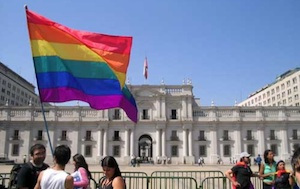
BY NITIKA KHAITAN:
The federal Defense of Marriage Act may have appeared before the U.S. Supreme Court last Wednesday, but the United States lags behind in the globalization of same-sex marriage rights. And the countries ahead of it include not only the Netherlands, Belgium, Spain or other parts of Europe but also Argentina, Brazil and hopefully soon, Uruguay.
Argentina became the first Latin American nation to grant same-sex couples the freedom to marry throughout the country on July 15, 2010. In Brazil, most provinces provide homosexual partners the opportunity to get married with a two-step process in which they must petition a court for their union to be recognized as a marriage. In the Brazilian provinces of Alagoas, Bahia and São Paolo, gay and lesbian couples can get married without the two-step process.
As for Uruguay, the lower house of the Uruguayan legislature approved the Marriage Equality Law for same-sex marriages on December 11, 2012. Uruguayan senators delayed the final vote though, arguing that there was a need for more discussion. Nonetheless, when the law is again voted upon (on an as yet unspecified date) in April, it is widely expected to pass. This expectation is partially based on the successes of the gay rights movement in Uruguay in recent years. In 2009, Uruguay lifted a ban on homosexuals in the military that had been instituted during the 1973-85 military dictatorship. That same year, Uruguay became the first Latin American country to allow same-sex couples to adopt.

Gay rights movements in Latin and South America meet significantly more opposition from the clergy than experienced in many Western countries. This is due to the overarching influence of and immense power wielded by the Catholic Church. However, the courts of most of these countries strictly adhere to standards set by international law, especially in the case of individual human rights, as nearly all of them are under the jurisprudence of the Inter-American Commission and Court on Human Rights under the Organization of American States.
There are also, of course, particular country-specific reasons for the successes and failures of the gay rights movement. For instance, during the debate in Argentina over the marriage equality law, the Archbishop of Buenos Aires, Cardinal Jorge Bergoglio, wrote a letter calling the proposal to extend the right to marry to homosexuals “a move by the father of lies,” one that sought to destroy and make unnatural the Argentinian family unit. However, the church’s opposition and Bergoglio’s language, which was called “medieval” and “reactionary,” may in fact have worked in favor of the law’s approval. As one political commentator explained, the church that said gay marriage would have consequences also said divorce would have consequences. Since the divorce law was passed decades ago, there has been a change in the attitude towards the church and its role in state affairs, which contributed to the passing of the equal marriage law.
In the face of all these changes, other countries like Paraguay, Chile, Bolivia and Mexico are experiencing ripple effects and while Latin America is far from a paragon of equality, it is undeniably making slow but steady progress towards getting there. Countries like the United States are now left to decide whether to join in the gay rights revolution that is now sweeping across even some of the most conservative regions in the world.
Nitika Khaitan ’16 is in Silliman College. As a Globalist Notebook blogger, she writes about issues regarding human and political rights in Central and South America. Contact her at nitika.khaitan@yale.edu.